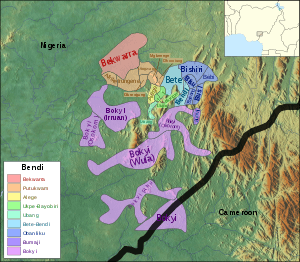Bendi languages
The Bendi languages are a small group of Benue–Congo languages of uncertain affiliation spoken in Cross River State, southeastern Nigeria, with one (Bokyi) having some speakers in Cameroon. Once counted among the Cross River languages, Blench (2011) suggests that they may actually be a branch of Southern Bantoid, and observes similarities especially with the Ekoid languages.[2]
| Bendi | |
|---|---|
| Geographic distribution | Cross River State in southeastern Nigeria, and southwestern Cameroon |
| Linguistic classification | Niger–Congo
|
| Glottolog | bend1256[1] |
 The Bendi languages shown within Nigeria and Cameroon:
| |
Very little research has been conducted on the Bendi languages, and the modern work that does exist often remains either unpublished or inaccessible.[3] The group is notable for having one language (Ubang) that has male and female forms.[3]
Languages
The Bendi languages are:
- Alege, Obanliku, Bekwarra, Bete-Bendi, Bokyi, Bumaji, Putukwam, Ubang, Ukpe-Bayobiri.
The data is too poorly covered to allow for detailed internal classification of these languages.
Names and locations
Below is a list of language names, populations, and locations from Blench (2019).[4]
| Language | Cluster | Dialects | Alternate spellings | Own name for language | Other names (location-based) | Other names for language | Exonym(s) | Speakers | Location(s) |
|---|---|---|---|---|---|---|---|---|---|
| Bekwarra | Bekwara, Bekworra | Yakoro | 27,500 (1953), 34,000 (1963), 60,000 (1985 SIL) | Cross River State, Ogoja LGA | |||||
| Obanliku | Basang (Bàsáu), Bebi, Bishiri, Bisu (Gayi), Busi | Abanliku | 19,800 (1963); estimated 65,000 (Faraclas 1989) | Cross River State, Obudu LGA | |||||
| Obe cluster | Obe | Mbube Eastern (a geographical name); Ogberia | Mbe Afal (by the Mbe) | 16,341 (1963) | Cross River State, Obudu LGA. 6 villages: Nkim, Ogboria Ogang, Ogboria Uchuruo, Ojerim (Ojirim), Árágbán, and Òbósó. | ||||
| Mgbenege | Obe | Cross River State, Obudu LGA | |||||||
| Utugwang | Obe | Otugwang | Cross River State, Obudu LGA | ||||||
| Okwọrọgung | Obe | Okorogung | Cross River State, Obudu LGA | ||||||
| Ukwortung | Obe | Okorotung, Okwọrọtung | Cross River State, Obudu LGA | ||||||
| Ubang | Ùbâŋ | Cross River State, Obudu LGA | |||||||
| Ukpe–Bayobiri cluster | Ukpe–Bayobiri | 12,000 (1973 SIL) | Cross River State, Obudu and Ikom LGAs | ||||||
| Ukpe | Ukpe–Bayobiri | ||||||||
| Bayobiri | Ukpe–Bayobiri | ||||||||
| Alege | Cross River State, Obudu LGA | ||||||||
| Bete–Bendi | Bete, Bendi | Bette–Bendi | Dama | 17,250 (1952), 36,800 (1963) | Cross River State, Obudu LGA | ||||
| Bumaji | Cross River State, Obudu LGA | ||||||||
| Afrike-Irungene cluster | Afrike-Irungene | Cross River State, Ogoja LGA | |||||||
| Afrike | Afrike-Irungene | Aferikpe | 3,500 (1953) | Cross River State, Ogoja LGA | |||||
| Irungene | Afrike-Irungene | Cross River State, Ogoja LGA | |||||||
| Bokyi | By clans: Abo, Bashua, Boje, East Boki, Irruan, Osokum, Basua/Ɓashua, Wula: Báswó, Okúndi, Kecwan | Boki | Nki, Okii, Uki | Nfua | 43,000 (1963); 50,000 in Nigeria (1987 UBS), 3,700 in Cameroon (SIL) | Cross River State, Ikom, Ogoja and Obudu LGAs; and in Cameroon |
Numerals
Comparison of numerals in individual languages:[5]
| Language | 1 | 2 | 3 | 4 | 5 | 6 | 7 | 8 | 9 | 10 |
|---|---|---|---|---|---|---|---|---|---|---|
| Bekwarra | kìn | -hà | -cià | -nè | -dyaŋ | -dyaàkìn (5 + 1) | -dièhà (5 + 2) | -diècià (5 + 3) | -diènè (5 + 4) | irifo |
| Bete-Bendi (Bə̀ttə́) (1) | ìkèn | ìfè | ìkíé | ìnè | ìdíɔ́ŋ | ìdíɔ́ŋ ìkèn (5 + 1) | ìdíɔ́ŋ ìfè (5 + 2) | ìdíɔ́ŋ ìkíé (5 + 3) | ìdíɔ́ŋ ìnè (5 + 4) | lèhʷó |
| Bete-Bendi (Bette) (2) | iken | ifee | ikʲe | inde | idʲoŋ | idʲoŋ-iken (5 + 1) | idʲoŋ-ifee (5 + 2) | idʲoŋ-ikʲe (5 + 3) | idʲoŋ-inde (5 + 4) | lihʷo |
| Bokyi | kíbɔ́ŋè | bìfɛ̀ː | bìt͡ʃât | bìɲìː | bìtáŋɛ̀ | ɲât͡ʃât (lit: "add three") | kát͡ʃákáɲì (lit: 3 plus 4) | ɲíríɲì (lit: 4 plus 4) | kátáŋɛ̀káɲì (lit: 5 plus 4) | děːk͡púː |
See also
- Bendi word lists (Wiktionary)
References
- Hammarström, Harald; Forkel, Robert; Haspelmath, Martin, eds. (2017). "Bendic". Glottolog 3.0. Jena, Germany: Max Planck Institute for the Science of Human History.
- Blench, Roger (2011). "'The membership and internal structure of Bantoid and the border with Bantu" (PDF). Berlin: Humboldt University. p. 17.
- "Bendi languages". www.rogerblench.info. Retrieved 2017-07-31.
- Blench, Roger (2019). An Atlas of Nigerian Languages (4th ed.). Cambridge: Kay Williamson Educational Foundation.
- Chan, Eugene (2019). "The Niger-Congo Language Phylum". Numeral Systems of the World's Languages.
- Blench, Roger. 2001. The Bendi languages: more lost Bantu languages? 32nd Annual Conference on African Linguistics: Benue-Congo Workshop Berkeley, 26-27th March, 2001.
External links
- ComparaLex, database with Bendi word lists